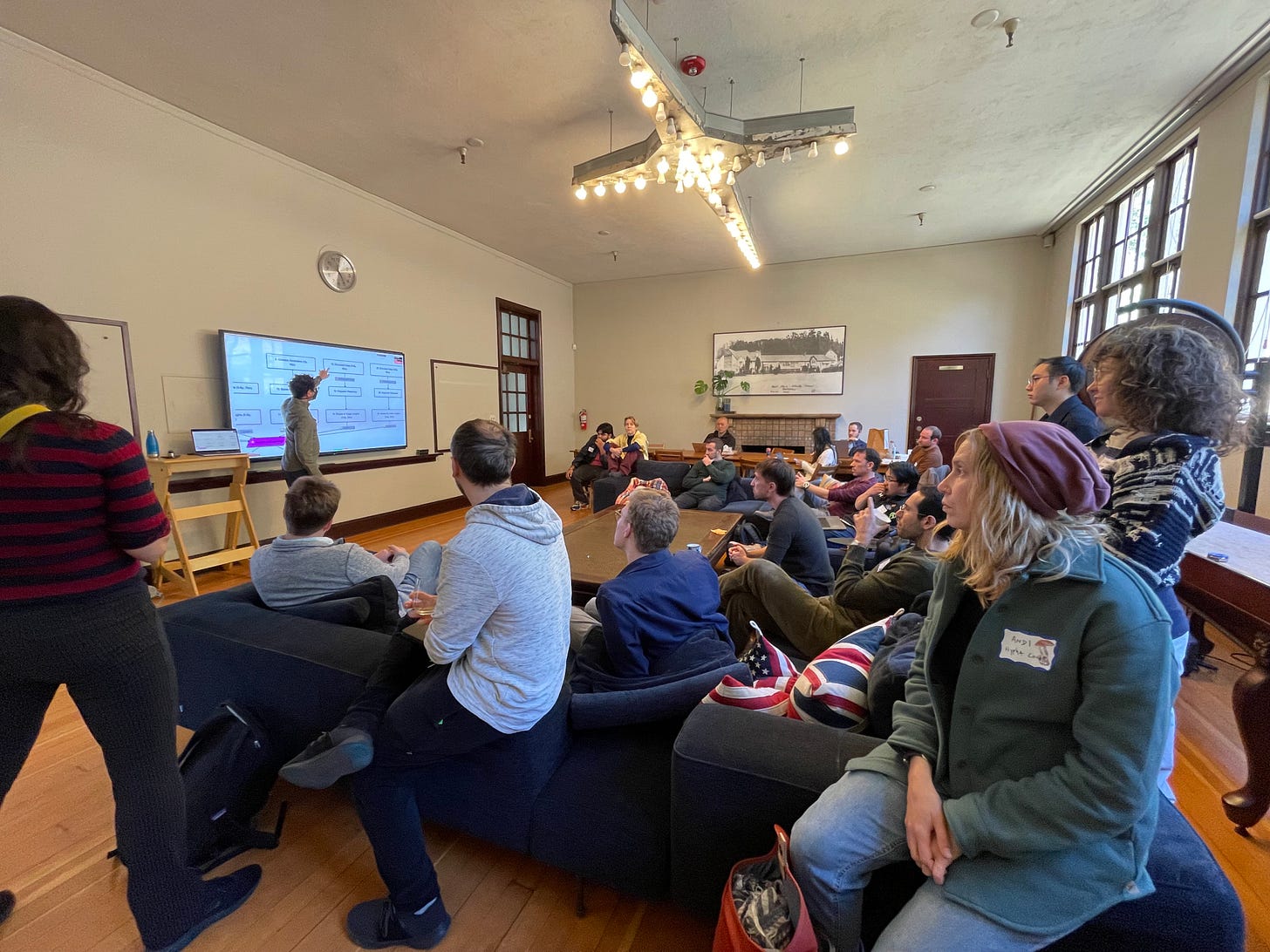Interop1: Building the Foundations of a More Interoperable Deliberation Ecosystem
What does it take to build a digital democracy that isn’t owned or dominated by any single platform?
Over the past seven months, we at Metagov have been privileged to explore that question in collaboration with 21 teams of governance tool builders from around the world. Supported by a grant from the Mina Foundation, “Interop” set out to make today’s collective intelligence tools more open, modular, and interoperable, laying the groundwork for a capture-resistant ecosystem of deliberative tooling.
Goal of the Interop Program
Back in Fall 2023, Aviv Ovadya imagined a program to foster a deliberative tooling ecosystem that is resistant to capture by single private entities, and suggested Metagov run it. That meant starting small, with open-source licensing, shared flat-file formats for importing and exporting data, and a cohort model designed for maximum collaboration.
What We Did
Granted $169,245.56 to 14 projects to advance interoperability
Supported 7 additional teams with participation stipends
Brought together 21 teams in total for the program from July 2024 to January 2025
Hosted two major gatherings: a 2-day offsite in Berkeley and a 5-day online Symposium
Launched 6 collective workstreams focused on shared infrastructure and frameworks
What We Built
From technical integrations to shared values, the cohort made huge strides. Some highlights:
Decidim added the import / export of open data, and wrote their documentation here
Stanford PB filed a pull request to implement the Method of Equal Shares algorithm, and export into the .pb standard
Chore Wheel was modularised into Power Ranker, and made the underlying PowerRanker class available as an NPM package. This update made Chore Wheel usable outside of Slack and implementable into any platform that wishes to use the Budget Box algorithm for continuous participatory budgeting - a great example of how to modularise a deliberative tool for use in another platform.
Polis created a read-only API available on all conversation reports, for data export, and pushed it to production on pol.is. Announcement here.
Deliberative Canvas created a visualization platform for exploring results from Polis using Kumu, and documented it well.
Hypha implemented and excellently documented its open-source governance dashboard
Discourse Graphs implemented their flat-file export format and were able to use these outputs as a Proof of Concept to apply for and receive funding from Chan-Zuckerberg.
Constituency Listening built a system from scratch. Documentation.
And that’s just the beginning.
A growing collection of outputs — including an AI Facilitation Library, a shared values statement, and a GitHub of flat-file standards — show how this group of builders is co-creating the plumbing for a more open deliberative future.
From Tools to Ecosystem
At our October 2024 in-person offsite at Society Library in Berkeley, the cohort gathered along with RDs Aviv Ovadya and Josh Tan, and new support and direction from Liz Barry who had just joined as Executive Director of Metagov. Instead of 21 isolated projects, we began to see ourselves as a cohort — collaborating on shared vocabularies, common data standards, and mutual governance values.
Leaving the in-person offsite, we formed 6 teams that were aimed at doing the collective work that it took to build interoperability between each team.
These teams worked together for several months after the offsite to build the foundations for interoperability from organizational and social infrastructure to technical infrastructure.
At the end of the program, we hosted a distributed Symposium where each of these groups presented the work they had been doing over the past several months. By the end, we capped off the program with over 60 participants documenting collaborative work done across the 21 project teams in 6 sessions: Vocabulary and Road Map, Data Commons, AI Facilitation, Participant Rights, and Values for the Deliberative Tooling ecosystem (a conversation which led to this essay on values in governance technology published in a series alongside pieces by Metagov friends Larry Lessig and Audrey Tang), and Meta-collaboration which informing a podcast + deliberative tooling gallery for broader discoverability.
What We Learned
Two big lessons emerged:
Collaboration works best when grounded in clarity. A flat-file format gave teams a shared starting point, but real cooperation came when we added focused goals, good facilitation, and in-person trust-building.
Tool builders are ready for more. Beyond interoperability, this ecosystem is hungry for aligned values, shared infrastructure, and better tooling for AI, consent, and governance modeling.
What’s Next
This cohort wasn’t the finish line, it was the foundation. Our working groups are moving forward on both values and standards. Keep an eye on these projects and channels for ongoing opportunities for collaboration:
A Theory + Practice project to speed exchange among delib-tech builders and political scientists.
#deliberative-tools-and-interop – This is the public channel for collaborating with Metagov members beyond the cohort. See this channel’s Slack Canvas for a list of all related channels, including:
#ai-facilitation – The goal of this workstream is to standardize terms used in facilitation to both train AI agents to facilitate as well as educate humans to facilitate. This group is looking for input on facilitation strategies, large datasets, and ways your tool might use the library.
#data-puddle – Add your data model to our GitHub! This is key to keeping our processes open and fostering collaboration. We’ve already got contributions from 4 different teams including a large public dataset from Make.org. We’ll also use these contributions to explore routes to training Public AI, in collaboration with:
#participation-ethics – Lawyers created a draft Terms of Service that emerging tools can adopt to interact ethically with their participants. If your workflow, data needs, and/or respect for the rights of participants in your process could inform the composable Terms of Service template, join the discussion!
Thanks to all our collaborators, advisors, and friends who showed up to imagine new ways to govern together. If you are excited about this work, please get in touch as we are fundraising for Interop2 and seeking partners for the next residency.
Let’s keep building,
The Interop Team






